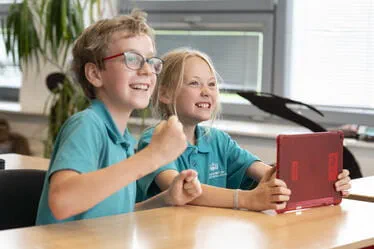First, what is social and emotional learning?
In simple terms, we see social and emotional learning as a way of developing a child’s personal awareness, self-control, and socials skills in ways that will help them be successful in the classroom and later on as they enter the worlds of higher education and work.
But why is social and emotional learning ever so important? Because it covers how children process their own emotions and thoughts. We encourage them to explore their emotions and relationships in healthy ways so they’re making positive choices and can learn how to best cope with stressful situations when they arise.
It’s also about teaching empathy, so children are best able to understand the feelings of others - this is absolutely vital to help them develop life-long friendships and work relationships. Students with strong skills in these areas are better able to manage their time, can navigate relationships with ease, and are more likely to be deeply engaged with their school lessons.
From awareness to emotional regulation to relationship management and beyond, we see social and emotional learning as key aspect of a child’s education.
The benefits of social and emotional learning at PBIS.
While the development benefits are clear, we also want to lay out some of the academic benefits too. Social and emotional learning is shown to reduce behavioural problems that can result from children undergoing stress, anxiety, or even depression.
We work hard to support children in developing key skills needed to have healthy relationships and make responsible choices. To put this into practice, social and emotional learning touchpoints have been incorporated into our curriculum to better prepare your child for future challenges, and it’s a key part of our offering.
Overall, we know social and emotional learning is important at any age, but we see it as especially vital in the Early Years and Primary school. Laying strong foundations at a young age means your child will have the skills to be successful all throughout their school years and beyond.

What are some social and emotional learning activities?
There are so many to try! Here are just a few activities you can try at home with your child:
- Family discussions: Chat with your child to explore their own emotions and so they can learn how they view others’ emotions. Trying to ask your child to reflect on their own emotions. How are they feeling today? What caused them to feel this way? How do they think the others around them are feeling too?
- Role-playing allows students to practice skills in a supportive environment. Try role-playing a situation where your child will have to peacefully resolve a conflict. This can be done through play as well. Or how about presenting them with a situation where they feel angry — what techniques could they use to calm down? Give suggestions such as deep breathing or talking their feeling out.
- Learning through play: Games with friends and family can be a great way to teach your child new social and emotional skills. Try playing a game where they must identify all the different emotions people can feel. It’s amazing when you consider the range of emotions we all have.
Social and emotional learning strategies
Some proven strategies include modelling good behaviour, identifying ways to manage emotions, coaching through real-world situations, and more
We know that social and emotional learning is an essential skill for our students, and we work hard to integrate it into our curriculum so our students can build strong relationships with their follow students, teachers, and families.












